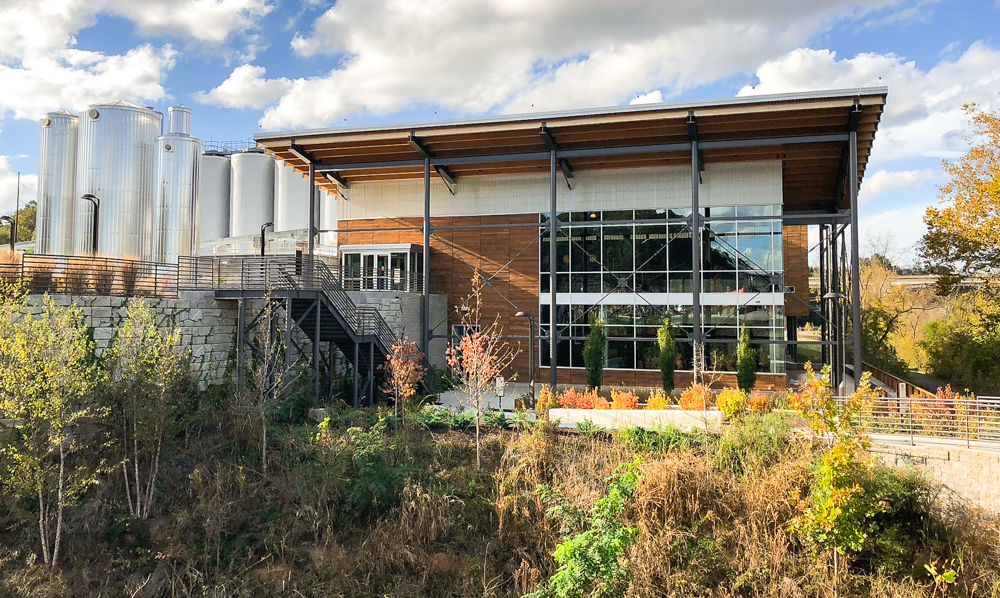
Jay Richardson seems baffled by the question: What advice would you give to a company interested in becoming more environmentally responsible? Where should they start?
After giving the question some thought, he responds: “We don’t have a green initiative. Every decision we make, at all levels, honors the Earth whenever possible.” In short, it’s business as usual at New Belgium, and has been since day one.
Richardson is the General Manager of New Belgium Brewing Co.’s 2-year-old brewery in Asheville. On April 27, he’ll deliver the keynote address at EarthShare North Carolina’s 4th Annual Earth Day Breakfast. Among his topics is how Fort Collins, Colo.-based New Belgium has embraced and Earth-first philosophy since the day in 1991 when co-founders Jeff Lebesch and Kim Jordan took a hike in the foothills outside town.
“Up until then, Jeff had been a home brewer,” explains Richardson, who was New Belgium’s head of IT before opening the Asheville plant in 2016. “When they got to the point where they had to decide whether to start adding employees, they took their journals into the foothills, found a comfortable spot, sat down and started making notes.”

Their business plan was rooted in one simple concept: “‘If we’re going to do this thing,’” Richardson says, paraphrasing, “‘if we’re going to involve other people, it’s gotta be meaningful. They started jotting down things … environmental stewardship was important from the beginning.”
What being green looks like
That day-one commitment has resulted in a company that:
- Sees 99.9 percent of its waste avoid the landfill
- Produces 12 percent renewable energy on site
- Earned a score of 55 for environmentalism from the Certified B Corp lab (the median score for other companies who’ve gone through the assessment: 7)
- Along with about 400 other companies, supports the Paris Climate Agreement
- Gives its employees a bicycle after one year of employment
Richardson chuckles when asked about the bike.
“Well, in Fort Collins, which is perfectly flat, it was a beach cruiser. We quickly realized that a heavy, one-speed bike wouldn’t work in Asheville. We’ve got a commuter-style bike, with gears.”
Richardson likens being green to another relationship that’s not always easy.
“A business relationship with the Earth is like a marriage: it takes work to be successful. Not just at the beginning. Industry changes: to stay meaningful you always have to work at it.”
Three bottom lines
For six years, New Belgium has been a Certified B Corp, a designation earned by fewer than 2,500 for-profit companies worldwide who “meet rigorous standards of social and environmental performance, accountability, and transparency.”
“As a Certified B Corp.,” says Richardson, “we have three bottom lines. We have our financial bottom line, we have a bottom line for the planet, and we have a bottom line for people, both our [employees] and the people in our communities.”
It can, admits Richardson, be hard to achieve all three bottom-lines simultaneously.
“Sometimes it’s a matter of recognizing when we need to relax one effort to address others.” For instance, New Belgium, which laid off 28 employees in February (it has a workforce of about 800) was planning to install solar panels at its Asheville plant, but the financials currently don’t support the investment. “As soon as the financials change,” Richardson adds, “we’ll make that happen.”
But revenue doesn’t affect many of the other day-to-day practices that keep a company environmentally friendly.
“Take a cardboard case that holds four six-packs,” says Richardson. “We’ll take a look at one that’s been used once or twice and think, ‘Is this really ready for recycling? Can we get one more use out of it?’
“There’s a mindset for environmental stewardship,” he adds. “That mindset is top of mind for everyone.”
So if Richardson does have a bit of advice for companies interested in becoming greener, it would start with hiring people committed to protecting the planet.
“That’s an aspect of candidates that we want to know.”
Think long-term
Richardson also advises to think long term.
When they were designing the Asheville plant, says Richardson, one of their big investments was in a big kettle used to sterilize water before yeast is added.
“It’s the most energy intensive portion of operation, to boil a large body of liquid for 30 minutes.
“We opted for a kettle that has steam and heat recapture, which can be reused in other parts of the the process. It costs more money; however, in the full analysis over the life of the brewery [about 50 years for this kettle], I’m pretty sure it works out in our favor costwise. And it certainly works in the Earth’s favor.”
He also encourages companies to go the B Corp route. “It’s a holistic approach,” he says.

Partner with non-profits
Another good first step: “Partner with non-profits dedicated to a better world.”
To make your contribution have an impact in the face of so many worthwhile options, Richardson recommends focusing on issues important to your company. In the case of New Belgium, “we focus on five pillars:
- Water. “Anything about water. It’s a hot topic for us: beer is 95 percent water.”
- Bicycle advocacy. “That was a thing with Jeff. In 1988, he biked around Belgium to educate himself about that style of beer; he named his next beer Fat Tire. It came to represent an emblem for simplicity, alternative transportation, and for fun.”
- Sustainable agriculture. Another direct connection to the business: malted barley, wheat, hops.
- Smart growth and the climate.
- Youth environmental education
Richardson says there are great, and perhaps unexpected, rewards in partnering with nonprofits.
“Once you find a nonprofit important to your business you build relationships, you enjoy being around them. You look forward to your community service, as opposed to saying, ‘Man, I need to look for way to get in my 5 hours of community service this month.’”
There is, he adds, strength in numbers when it comes to protecting the planet.
“We are way stronger when we work together.”
More info
- Jay Richardson will deliver the keynote address at EarthShareNC’s 4th Annual Earth Day Breakfast on Friday, April 27, from 8 – 9:45 a.m. at The Stockroom at 230 in downtown Raleigh. For more information and tickets, go here.
- To learn more about EarthShareNC and its mission, go here.Jay RichardsonTo learn more about Certified B Corps, go here.
